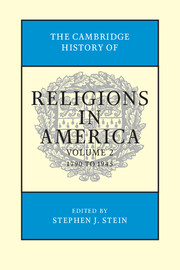Book contents
- Frontmatter
- Contents
- Contributors
- Editor's Introduction
- SECTION I RELIGION IN NORTH AMERICA
- SECTION II RELIGIONS IN THE NEW NATION, 1790–1865
- SECTION III CHANGING RELIGIOUS REALITIES
- 11 Diversity, Revival, Rivalry, and Reform: Protestant Christianity in the United States, 1800–1950
- 12 American Catholics, 1800–1950
- 13 American Judaism, 1820–1945
- 14 Formation and Consolidation of African American Religious Communities, 1865–1945
- 15 Eastern Orthodox Christianity in America
- 16 New Religious Movements
- 17 American Indian Religions in America, 1790–1945
- 18 Why Muslims Matter to American Religious History, 1730–1945
- 19 Asian Religions in the United States: The Role of the 1893 World’s Parliament of Religions in Shaping an Evolving Pluralist Ideology
- 20 Metaphysical Movements
- SECTION IV RELIGIOUS RESPONSES TO MODERN LIFE AND THOUGHT
- SECTION V COMPARATIVE ESSAYS
- SECTION VI RELIGION AND DIVERSE AREAS
- Index
- References
19 - Asian Religions in the United States: The Role of the 1893 World’s Parliament of Religions in Shaping an Evolving Pluralist Ideology
from SECTION III - CHANGING RELIGIOUS REALITIES
Published online by Cambridge University Press: 28 July 2012
- Frontmatter
- Contents
- Contributors
- Editor's Introduction
- SECTION I RELIGION IN NORTH AMERICA
- SECTION II RELIGIONS IN THE NEW NATION, 1790–1865
- SECTION III CHANGING RELIGIOUS REALITIES
- 11 Diversity, Revival, Rivalry, and Reform: Protestant Christianity in the United States, 1800–1950
- 12 American Catholics, 1800–1950
- 13 American Judaism, 1820–1945
- 14 Formation and Consolidation of African American Religious Communities, 1865–1945
- 15 Eastern Orthodox Christianity in America
- 16 New Religious Movements
- 17 American Indian Religions in America, 1790–1945
- 18 Why Muslims Matter to American Religious History, 1730–1945
- 19 Asian Religions in the United States: The Role of the 1893 World’s Parliament of Religions in Shaping an Evolving Pluralist Ideology
- 20 Metaphysical Movements
- SECTION IV RELIGIOUS RESPONSES TO MODERN LIFE AND THOUGHT
- SECTION V COMPARATIVE ESSAYS
- SECTION VI RELIGION AND DIVERSE AREAS
- Index
- References
Summary
Born in the colonial experience, the ideology of religious plurality was a consistent part of American life in the eighteenth and nineteenth centuries. Nurtured by societal battles that emphasized diversity including slavery, immigration, and the role of alternative religions, the pluralist ideology drew increasing momentum from the first interfaith gathering on American soil – the 1893 World's Parliament of Religions in Chicago. As the first public interfaith conversation in the United States, the parliament not only gave voice to Asian religions but also held a mirror to American Christians, for the first time countering expressions of exclusivism that had been part of the Protestant missionary and evangelical traditions. This challenge to the homogeneous view of religious America was followed in the first quarter of the twentieth century by other voices who questioned the vision of the United States as a melting pot following the rapid growth of immigrant communities.
The presence of Asian immigrants in the United States began with the discovery of gold in Sutter's Creek in California in 1849 and with the rapid expansion of the railroads in the second half of the nineteenth century. The railroads and mines hired large numbers of Chinese who were exploited as a cheap source of labor. In California and the Northwest, Asian Indians came to work in the lumber industry following their early presence in Vancouver.
- Type
- Chapter
- Information
- The Cambridge History of Religions in America , pp. 414 - 434Publisher: Cambridge University PressPrint publication year: 2000



